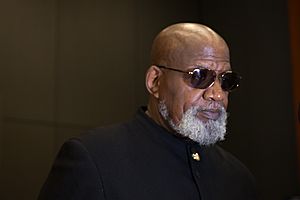Harry Edwards (sociologist) facts for kids
Quick facts for kids
Dr. Harry Edwards
|
|
|---|---|
 |
|
| Born |
Harry Edwards
November 22, 1942 |
| Alma mater | Fresno City College San Jose State University (BA) Cornell University (PhD) |
| Spouse(s) |
Sandra Y. Boze
(m. 1970) |
| Awards | Woodrow Wilson Fellowship |
| Scientific career | |
| Fields | Sociology |
| Institutions | University of California, Berkeley |
Harry Thomas Edwards, born on November 22, 1942, is an American expert in sociology and a champion for civil rights. Sociology is the study of how people live together in groups and societies. Dr. Edwards taught at San Jose State College and earned his Ph.D. from Cornell University. He is now a retired professor (Professor Emeritus) at the University of California, Berkeley. His work has mostly focused on the lives and experiences of African-American athletes. Many people see him as the founder of the 'sociology of sport,' which looks at how sports and society are connected. He is also a top expert on how diversity fits into sports.
Contents
Dr. Harry Edwards's Career
Dr. Edwards has spent his career focusing on the experiences of African-American athletes. He strongly believes that Black people should be involved in managing professional sports teams. He has worked as a consultant for famous teams like the San Francisco 49ers football team and the Golden State Warriors basketball team. He also helped recruit Black talent for important office jobs in Major League Baseball.
Fighting for Human Rights in Sports
Dr. Edwards wrote a book called The Revolt of the Black Athlete. He also created the Olympic Project for Human Rights. This project led to a famous protest at the 1968 Summer Olympics in Mexico City. Two African-American athletes, Tommie Smith and John Carlos, raised their fists in a "Black Power Salute." Both athletes were from San Jose State University, where Dr. Edwards himself had been a discus thrower on the track team. Before the Olympics, in early 1968, Dr. Edwards spoke at Cornell University. He publicly supported a boycott of the 1968 Summer Olympic Games by Black athletes.
His Impact and Message
The New York Times Magazine once wrote that Dr. Edwards sees himself as someone who encourages others to act. He is a reformer, not someone who wants to completely change everything. The magazine noted that no other person in sports has done as much to show that problems in society, like racism and corruption, also exist in sports. Sports are not separate from these issues.
Dr. Edwards told Time magazine that he wants to be a role model. He was a promising athlete who could have played professional sports. Instead, he chose to become a scholar and study important issues. He said, "We must teach our children to dream with their eyes open." He explained that the chances of becoming a famous athlete like Jerry Rice or Magic Johnson are very small. He believes that Black children should use their energy in ways that will make them productive citizens in a world that uses more and more technology.
Later Work and Recognition
In 2014, the University of Texas at Austin started a special lecture series named after Dr. Edwards. It was called the "Dr. Harry Edwards Lectures on Sport and Society." However, in 2016, Dr. Edwards ended his connection with the lecture series. This was because the State of Texas put a "campus concealed carry law" into effect at the university.
Dr. Edwards has also appeared in several documentaries and films. He was a commentator in the 2016 documentary miniseries O.J.: Made in America. He also had a small role as himself in the 2019 film High Flying Bird. He appeared in the documentary The Stand: How One Gesture Shook the World, which was about the protest by Tommie Smith and John Carlos at the 1968 Summer Olympics.
 | Kyle Baker |
 | Joseph Yoakum |
 | Laura Wheeler Waring |
 | Henry Ossawa Tanner |

